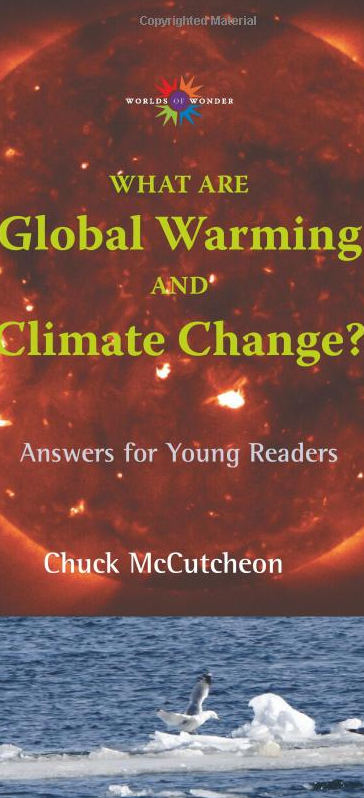 What are Global Warming and Climate Change?: Answers for Young Readers
What are Global Warming and Climate Change?: Answers for Young Readers is a fairly unique book, as far as I know. It explains climate change, contextualized global warming, discusses causes and consequences and directly addresses the politics of climate change and global warming. The official book description:
"Global warming is one of the most talked about science subjects today. Maybe you have seen pictures of polar bears or other animals stranded atop floating chunks of melting ice. Perhaps you have heard about or lived through extreme weather - hurricanes, floods, water shortages, heat waves, or electricity blackouts. Many of these events can stem from the world getting warmer. As that happens, the climate changes, too. This book helps young readers understand the sciences used to study global warming. Each chapter addresses specific questions about why the temperatures of the earth's air and oceans are rising. The information presented aligns with the findings of the Intergovernmental Panel on Climate Change: that most of the warming observed over the last half-century is due to human activities and that the impacts of global warming will be significantly negative. Using a question-and-answer format supplemented by hands-on activities, this book fosters an understanding of the complex processes at work in global warming while also enabling youngsters to think critically about their future. McCutcheon ends his book by offering young readers productive ways to think about - and act on - changes in the environment contributing to climate change. McCutcheon taps his mastery of a complicated, highly charged topic to permit young readers to become informed consumers of sciences associated with the most urgent topic of their future - global warming."
Perfect for an earth science or environmental science class in middle school or for the youngish home schooler. Now we need one for high school!
It is a textbook like hard cover, nicely laid out and richly illustrated. The book does a great job of dealing with modeling, climate-weather distinction, and the longer term history of human impact on the environment. The activities are fun and useful. Personally, I want every 9-12 year old to have this book.
I feel so sorry for today's parents haveing to ban these kinds of books in the home and explain why they are banned and expalin why this man made-up global warming crap is being peddled.
If you want young readers to read soemthing, let them read a brand new book called The Genius of Ancient Man by Don Landis. It paints a whole different view of "neanderthal" men. They weren't the big ugly stupid brutes that modern textbook indoctrination teaches. Well they might have been ugly, who knows? They were highly skilled and extraordinarily intelligent and this books explains why the modern textbook indoctrination viewpoint about neanderthals is wrong. Research and real science points to the fact that ancient man may have been far suerior in hunter skills, survail skills, and general intelligence than modern man. How did thye larn to make weapons? Steel? Bronze? How did they learn to hunt so efficeintly and even kill large animals like the T Rex when they were so small? These men were smart. Smarter than many I know today probably. At least they knew that their campfires were mere fires and never tried to profit off of carbon useage.